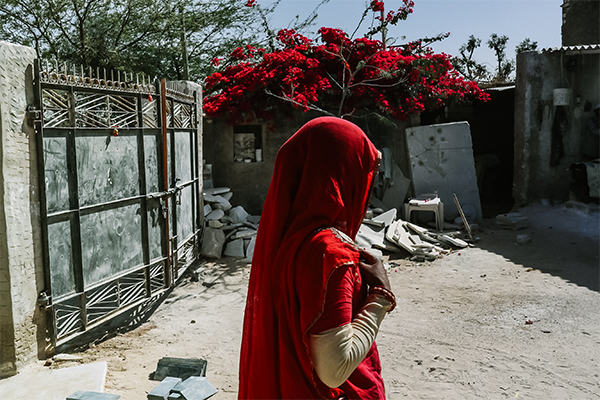Gender-based violence: "The Shadow Pandemic"

In India, the National Commission for Women reported a rise of 94 per cent in complaint cases where women have been abused in their homes during lockdown. © Kim Landy
For every three months of lockdown due to COVID-19, an estimated 15 million people—mostly women and girls—have suffered from gender-based violence, globally. Since the start of the pandemic, multiple international agencies and national activists have raised a red flag about the increase in gender-based violence (GBV).
“The increase in gender-based violence has been called the ‘shadow pandemic’ as it has sadly led to an increase in violence during lockdowns around the world,” said Jessica Carter, Opportunity International Australia’s Asia Health Program Director.
“Even without the strict conditions of lockdown, the economic and social pressures created by the pandemic could continue to drive an increase in gender-based violence cases,” she said.
In May, The United Nations Secretary-General António Gutterres, called on governments to make GBV a primary concern in their emergency response plans, and the United Nations Development Programme provided recommendations for mainstreaming GBV prevention and response into non-GBV specific interventions.
The increase in GBV and how to address it during COVID-19 has made headlines in all of Opportunity’s target countries throughout the pandemic. Particular to Opportunity International Australia is India where the National Commission for Women reported a rise of 94 per cent in complaint cases where women have been abused in their homes during lockdown.
“India already had high rates of gender-based violence, and Opportunity’s partner My Choices Foundation, a specialist in that area, has definitely seen a rise in cases in the last few months,” Carter said.
This month, the International Rescue Committee called for three clear actions from organisations responding to the pandemic:
- Prioritise gender-based violence within the response, whether the response is in the health, social or financial sector. For example, response organisations should raise awareness of the issue and promote options for emergency response services such as help hotlines.
- Support women and girls to participate fully in the design and delivery of COVID-19 response programs. For example, contextually specific solutions are needed to address the common challenge of women’s return to work/business, when schools have yet to resume.
- Put women and girls at the heart of the economic recovery measures. For example, organisations should ensure that women have access to financial support packages, through secure and potentially confidential channels, or delivered in ways that promote improved family relations.
“Since lockdown started in India, My Choices Foundation has responded to the crisis with new approaches to preventing two examples of gender-based violence – domestic violence and child trafficking. This has included launching a national counselling hotline for victims of domestic violence and experimenting with radio as a medium for building understanding of gender-based violence.
But with India now listed as the country with the third highest number of infections, GBV is set to remain as the shadow pandemic for some time.
“My Choices Foundation is planning for increased demand of their intervention services as well as increased need for prevention and education on the issue,” Carter said.
Find out more about how Opportunity partners with
My Choices Foundation